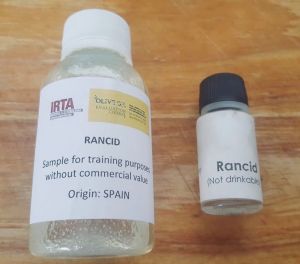- Home
- / Blog Main Page
- / RANCID OILS
RANCID OILS

RANCID OILS
Extra virgin olive oil (evoo) that has been exposed to Heat, Light and Air can quickly become rancid. (See posts on How to Store Extra Virgin Olive Oil and How to Shop for Extra Virgin Olive Oil). The original quality of the olive oil, its transportation, storage and where and how it is displayed in a shop are all factors which influence the possibility of an olive oil becoming rancid before it leaves the supermarket. Rancidity is the most common defect seen in olive oil and it is detrimental to our health.
See the following study below:
WHAT ARE THE HEALTH IMPLICATIONS OF CONSUMING RANCID FATS AND OILS?
Consuming rancid fats and oils may reduce the nutritive value of the food by destroying vitamins such as Vitamin A and E. There is also evidence to show that decomposition products produced by oxidised oil may be detrimental to health and have been linked to the development of neurodegenerative conditions such as Alzheimer’s and Parkinson’s Disease.
In animal studies, exposure to oxidised oils and fats has been shown to cause harm including growth retardation, organ toxicity, accelerated atherosclerosis, reduced immunity parameters, high newborn mortality and increased maternal insulin resistance.
The impact of long-term exposure to rancid oils (i.e. consuming for months or years) has not been investigated rigorously.
However, the current body of evidence suggests long term exposure to lipid oxidation products in doses seen in fish oil supplements, for example, are likely to have adverse effects on inflammation, oxidative stress and lipid metabolism.
A longer running 2007 North African study looked at food items that were associated with Nasopharangeal Carcinoma (NCP) and found that rancid butter and rancid sheep fat were associated with significantly increased risk of NPC. North Africa is one of the major NPC endemic regions. The large-scale case-control study looked at over 600 cases and 600 controls over a period of four years.
CONCLUSION
Although the impact of consuming rancid fats and oils in humans is yet to be fully elucidated, animal studies indicate that consuming rancid oils is detrimental to health. Therefore, people should avoid consuming rancid oils where they can.
WAYS TO ACHIEVE THIS INCLUDE:
Select fats and oils from a reputable trusted source.
Favour an oil that is lower in polyunsaturated fat such as extra virgin olive oil or coconut oil, as polyunsaturated fat oxidises more readily.
Choose an oil that is high in natural antioxidants, such as extra virgin olive oil.
Select a packaging size that allows full utilization of the oil within 4-6 weeks
depending on family size and consumption patterns.
Store cooking oils and oil supplements in a cool dry place and use within the best before date.
In the case of fish oil supplements, look to the studies that review oxidation of specific brands in various countries, or look to meet omega-3-fat recommendations through food sources where possible.
Read full study at:
https://prodolivewellness.s3.amazonaws.com/uploads/2019/08/OWI_Randicity-Paper_Jan-2020_no-crop.pdf

